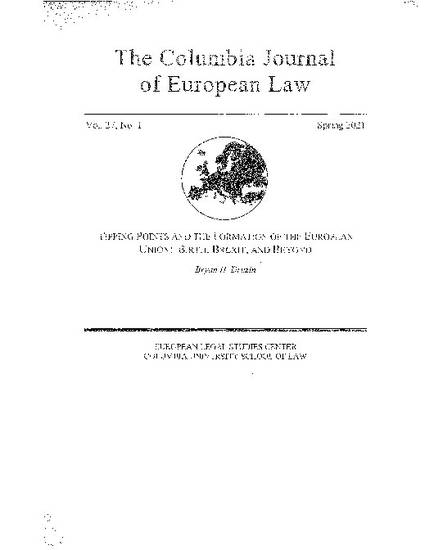
Article
Tipping Points and the Formation of the European Union: Birth, Brexit, and Beyond
Columbia Journal of European Law
(2021)
Abstract
This Article argues that tipping points played a decisive role in the formation of the European Union ("EU'). A tipping point occurs when a seemingly small event triggers a large and unexpected shift in a system. In the early period of the European project, two rival trade blocs-the European Free Trade Association ("EFTA'') and the European Economic Community ("EEC'')-were fiercely competing with one another. Both offered regulatory and legal standards to govern European economic cooperation that were equally serviceable. Yet the EEC (which later became the EU) prevailed in this institutional rivalry. I argue that the UK 's switch from EFTA to the EEC in 1973 was a tipping point that triggered an exodus from EFTA, culminating in waves of enlargement that saw the European project expand in a series of punctuated jumps during the 1980s, 1990s, and 2000s.
An important question follows from this tipping point model of EU formation: If the UK's entry into the EEC in 1973 tipped the market and caused European states to join the European project, will the UK's exit from the EU in 2020 eventually cause EU members to abandon the Union? Many fear that Brexit is a new tipping point that will trigger a domino effect in which other EU members will withdraw from the Union. This Article offers a structural analysis that suggests that Brexit is, however, unlikely to destabilize the EU.
Keywords
- EU,
- European Union,
- EFTA,
- Trade,
- Network effects,
- tipping,
- tipping points,
- IGO,
- International Organizations
Disciplines
Publication Date
Spring 2021
Citation Information
Bryan H. Druzin. "Tipping Points and the Formation of the European Union: Birth, Brexit, and Beyond" Columbia Journal of European Law (2021) Available at: http://works.bepress.com/bryan_druzin/37/
